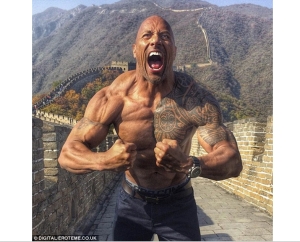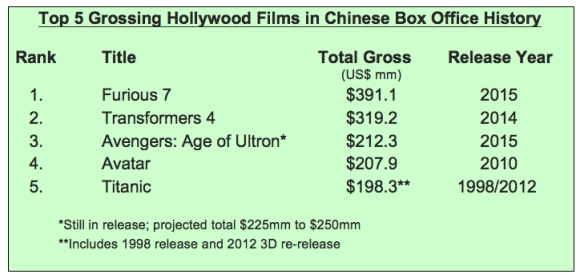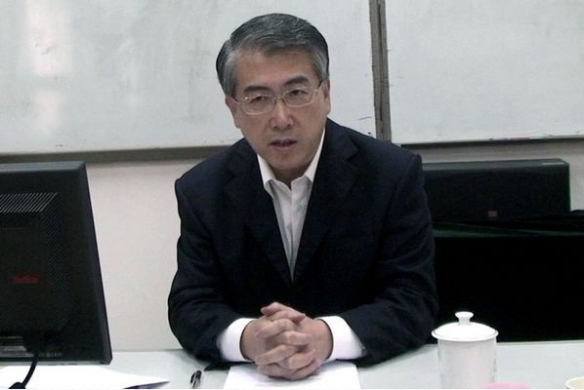Follow me on Twitter @robcain or Sina Weibo @robcain, or connect with me on LinkedIn.
Category Archives: General News
It’s a Bollywood-Hollywood David vs. Goliath Showdown at China’s Cinemas
It’s a Bollywood-Hollywood David vs. Goliath Showdown at China’s Cinemas
There is something new that has occurred in China this week: two of the top four ranks at the box office have been claimed by non-Hollywood, non-English language pictures.
Follow me on Twitter @robcain or Sina Weibo @robcain, or connect with me on LinkedIn.
China’s Billionaire Actress Zhao Wei (赵薇)
China’s Billionaire Actress Zhao Wei (赵薇)
China’s Billionaire Actress Zhao Wei (赵薇)
The world’s wealthiest working actress is a former kindergarten teacher with such keen investing acumen that she’s been nicknamed “China’s show-business Buffett” by her country’s media.
http://www.forbes.com/sites/robcain/2015/06/06/chinas-billionaire-actress-zhao-wei-赵薇/
Follow me on Twitter @robcain or Sina Weibo @robcain, or connect with me on LinkedIn.
Can China Save Disney’s “Tomorrowland”?
Can China Save Disney’s Tomorrowland?
China has become a sort of haven of second chances for films that disappoint in North America and Europe. Will it give Tomorrowland the ‘do-over’ that it needs?
http://www.forbes.com/sites/robcain/2015/05/26/can-china-save-tomorrowland/
Follow me on Twitter @robcain or Sina Weibo @robcain, or connect with me on LinkedIn.
Will Avengers 2 Beat Furious 7’s Worldwide Total? Better Ask China
Will Avengers 2 Beat Furious 7’s Worldwide Total? Better Ask China
Follow me on Twitter @robcain or Sina Weibo @robcain, or connect with me on LinkedIn.
China hold the key to Avengers: Age of Ultron’s global box office fate
L.A.-Beijing Production Company Sparkstone Lands 150 Episode China TV Commitment
Follow me on Twitter @robcain or Sina Weibo @robcain, or connect with me on LinkedIn.
By Robert Cain for China Film Biz
May 7, 2015
It gives me great pride and pleasure to be the first to announce that my good friends Scott Sommer and Long Wan, co-founders of L.A. and Beijing based Sparkstone Entertainment, have sealed a deal to develop and produce as many as five television series together with leading Chinese production company Croton Media.
The agreement guarantees Sparkstone a production commitment of at least 150 episodes for both the domestic Chinese and international markets.
In the short time since they founded Sparkstone in 2014, Scott and Long have set up deals, engaged and trained talent, raised financing commitments and developed new projects at a pace unmatched by any cross-Pacific entertainment company I’m aware of, including the major Hollywood studios. They are stand-up guys supported by stand-up advisors J. Todd Harris and Craig Berenson, and Croton Media is fortunate to have them as partners.
Croton, along with its parent, Huace Film & TV, is the leading television content provider in China, controlling 15% of the overall marketplace. Recently Croton acquired the rights to the hit Sony Television series Mad About You, which the company is now developing for Chinese audiences.
As Croton Media’s President of Production Larry Gao put it, “We like the hands-on approach and development instincts the principals of Sparkstone have demonstrated. A longer term deal where we could partner on specific projects seemed like a natural fit, and they’re someone we trust.”
Sparkstone is incorporated in both the US and China with the goal of bridging Hollywood and Chinese talent and finance to create independent film and television opportunities in both countries. Aside from Croton Media, they hold development and overhead deals with such companies as HeYi Capital and mobile gaming company YouMi, and have offices in Beijing.
The Croton deal culminates for Scott and Long a year of very hard work during which they’ve set up an organization that is truly unique in China. In a territory where the importance of creative development is too rarely acknowledged or even understood, they have made a big bet on their belief in story, and the bet has paid off. Keep on an eye on this group as they undoubtedly have many more successes to come.
Robert Cain is a producer and entertainment industry consultant who has been doing business in China since 1987. He can be reached at rob@pacificbridgepics.com and at www.pacificbridgepics.com
Why is China So ‘Furious’?
Follow me on Twitter @robcain or Sina Weibo @robcain, or connect with me on LinkedIn.
By Robert Cain for China Film Biz
April 22, 2015
In the weeks leading up to its April 12th opening day in China, the consensus among box office watchers was that Furious 7 would wind up with a final gross of around $125 million for its PRC run, and that its distributors would be ecstatic about that.
After all, only four Hollywood releases—Transformers 3, Transformers 4, Avatar and the 2012 Titanic re-release—have ever reached that rarefied level in China. The previous Fast & Furious installment had topped out at $68 million in Chinese receipts in 2013, a strong but not spectacular showing.
But from its earliest midnight screenings it was clear that Furious 7 wasn’t going to stick to the driver’s manual. Now, 11 days into its scorching China run, Furious 7 has amassed an incredible total of $280 million in China, and will likely finish up at about $375 million. With a May Day holiday boost and a bit of luck it could even approach $400 million. China is absolutely mad for Furious.
What was unthinkable just a few weeks ago is now a certainty: Furious 7 will not only beat the previous PRC record holder, Transformers 4, by a wide margin, but is also certain to top its own North American total. While it’s not unprecedented for films that do moderately well in North America to perform better in China than in their home territory (e.g., Pacific Rim), never before has a bona fide American smash hit exceeded its own domestic gross in a foreign territory. This is truly uncharted territory.
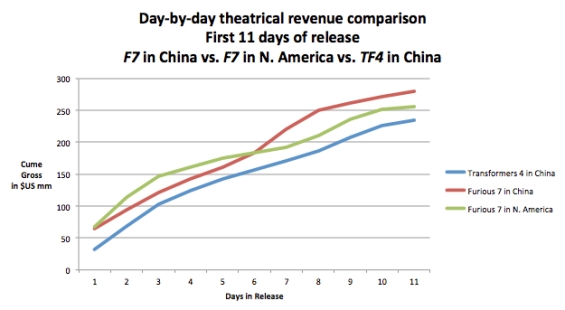 Source: Pacific Bridge Pictures research
Source: Pacific Bridge Pictures research
What happened? Let’s break it down.
Furious 7’s success in the Middle Kingdom can be explained partly by the same factors that made it a winner everywhere: quality marketing, high ‘want-to-see’ factor, and strong word of mouth. But several factors worked especially well in China to drive the film to its world-beating grosses:
- Advantageous release date. What first appeared to be a so-so Sunday release slot proved not to be a problem, mainly because Furious faced no Hollywood competition in its opening week, and it has flattened the Chinese films unfortunate enough to stand in its way. Even Chinese megastar Fan BingBing proved no match for Diesel, Walker and company, as her romance Ever Since We Love scored only $11 million this past weekend against nearly $90 million for F7.
- Massive release pattern. With an allocation of more than 70 percent of China’s screens, and more than 90,000 showtimes per day, this undoubtedly ranks as one of the widest releases ever seen. It’s only on the film’s third weekend that Furious will control less than half of all PRC screens as DWA’s Home and Arnold Schwarzenegger’s Sabotage arrive in mainland theaters.
- First-class promotion. With the two-year gap since Fast and Furious 6, Universal had plenty of lead time to work with SARFT and China Film Group–an investor in the film–to arrange a smooth release and mount a stellar marketing campaign. With CFG’s clout behind it and with its new China executive team in Beijing, the studio was able to support Furious 7 with more on-the-ground resources than with any past release.
- Strong word of mouth. Furious notched a very high 8.5 rating on audience review site Douban.com as word spread like wildfire that Furious 7 is FUN.
- The Paul Walker factor. Curiosity to see the final ride into the sunset of the well-liked actor who was in many ways the heart of this franchise drew numerous Fast and Furious newbies to Chinese multiplexes. Granted, this was an important factor in most of the world, but probably more so in China, where social media can instantly make or break a movie. According to a charming Chinese banker friend of mine, Paul Walker was THE trending topic of conversation on WeChat as the film rolled out.
- The right movie at the right time. Furious 7 is precisely the sort of big budget, effects-driven, Hollywood action spectacular that Chinese audiences love best. Sure, superhero movies are nice, but as the Transformers franchise has amply demonstrated, what the PRC really wants is machine porn: movies featuring monster machines that race and fly and do gravity defying stunts to save the world. It had been nearly a year since the last such film in this genre, Transformers 4, had graced China’s screens, so there was lots of pent-up demand for a film like F7 when it arrived.
There’s talk around the industry that Universal hasn’t yet decided whether to produce another installment of what is now the 8th highest grossing movie franchise in Hollywood history. That the ensemble of actors may not wish to come back for another film. To this I say, “If you believe that, there’s a Wall in China that I’d like to sell you.”
With all respect to the individuals involved, there is absolutely no way that Universal is going to put this golden goose down.
There are so many options Universal has now that Furious 7 has established its status as a juggernaut franchise in mainland China. They can produce the next installment of Fast and Furious as a co-production there and be reasonably assured of recouping their entire budget in the PRC alone, with the rest of the world, including North America, as gravy. If the cast doesn’t want to come back, re-boot it with a brand new cast. Or do a China spin-off with an all-Chinese cast. Do it with talking cars if necessary, for goodness’ sake! Or call me, I’ve got a script outline and treatment ready to go. But don’t think for a second about trying to stop this mean, green, driving machine.
Robert Cain is a producer and entertainment industry consultant who has been doing business in China since 1987. He can be reached at rob@pacificbridgepics.com and at www.pacificbridgepics.com
Faster and Furiouser: China’s Q1 Box Office Review
Follow me on Twitter @robcain or Sina Weibo @robcain, or connect with me on LinkedIn. 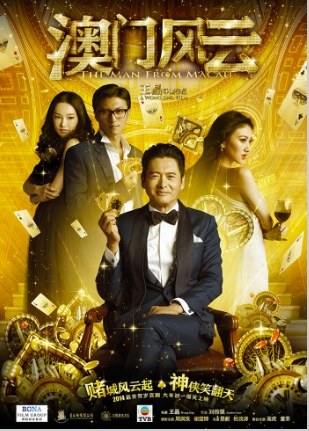 By Robert Cain for China Film Biz
By Robert Cain for China Film Biz
April 8, 2015
A Formula One race car. A California redwood tree. Superman. China’s box office.
Which one of these is not like the other?
A Formula One car can accelerate to 220 mph but it will eventually run out of gas. A redwood can grow tall and mighty but it will eventually reach its limit and topple to the ground. And Superman can’t keep flying forever—even he needs to take a break once in a while.
But the Chinese box office, like the Energizer Bunny, just keeps going and going and going. Two years ago I wrote in astonishment about the gravity-defying growth of the PRC’s movie business, and two years on the story just keeps getting bigger and better.
Fueled by a record-breaking February 2015 revenue haul which exceeded that of the U.S., and a March 2015 total that was 73 percent higher than the same period in 2014, aggregate PRC box office receipts for the first quarter of 2015 reached the unprecedented total of $1.54 billion. This is nearly 40 percent higher than the Q1 total in 2014, and more than China’s entire annual box office revenue of 2010.
If the trends of previous years hold, Q1 will account for about 22 to 24 percent of the year’s total gross. This would mean a year-end total somewhere between $6.4 billion and $7 billion. From there it will be just a few short years before China surpasses North America to become the world’s top box office territory.
Projected Annual Box Office, China vs. N. America, 2014-2020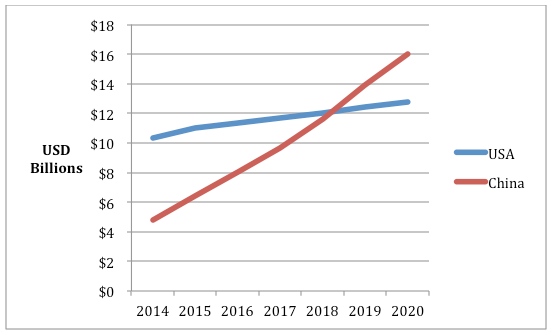
Even by China’s extraordinary standards of economic growth, the rise of the movie business has been nothing short of astounding. Just ten years ago China’s moviegoers accounted for barely one in one hundred of all the world’s ticket sales. By 2020 they will purchase more than one in three. 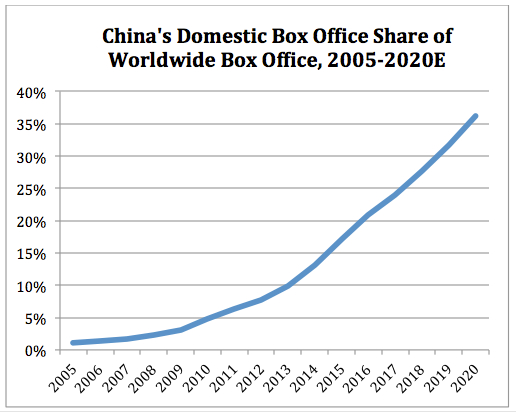 The impact of this massive growth is already being felt in the rest of the film world, with China becoming an increasingly important source of capital for films made in North America, Europe, and Asia. The global movie industry’s center of gravity is rapidly shifting across the Pacific from Hollywood to Beijing, and the key decisions about the types of films that are made, how and where they’re made, and who they’re made for are inevitably going to be heavily influenced by the Chinese Communist Party.
The impact of this massive growth is already being felt in the rest of the film world, with China becoming an increasingly important source of capital for films made in North America, Europe, and Asia. The global movie industry’s center of gravity is rapidly shifting across the Pacific from Hollywood to Beijing, and the key decisions about the types of films that are made, how and where they’re made, and who they’re made for are inevitably going to be heavily influenced by the Chinese Communist Party.
Of the 70 films released during China’s first quarter this year, 23 grossed at least 100 million RMB (US $16 million), and four crossed the $100 million threshold. The revenue leader for the year so far is the Chow Yun-fat starring action-comedy The Man From Macau II, which collected $154 million for Bona Film Group. March’s box office winner was Disney’s animated hit Big Hero 6, which moved into the #2 spot among China’s all-time highest grossing animated features at $85 million, just behind Dreamworks Animation’s Kung Fu Panda 2, which scored $92 million back in 2011.  U.S.-made films captured a modest 29.5% of the market in the quarter, the lowest share in several years, though they will begin to make up ground this weekend when Universal’s Furious 7 rolls into PRC multiplexes. Still, given the growing ability of Chinese films to compete on their home turf with Hollywood fare—not to mention SARFT’s careful management of the market—it’s unlikely that American films will ever come close again to taking 50 percent of China’s ticket sales as they did in 2012.
U.S.-made films captured a modest 29.5% of the market in the quarter, the lowest share in several years, though they will begin to make up ground this weekend when Universal’s Furious 7 rolls into PRC multiplexes. Still, given the growing ability of Chinese films to compete on their home turf with Hollywood fare—not to mention SARFT’s careful management of the market—it’s unlikely that American films will ever come close again to taking 50 percent of China’s ticket sales as they did in 2012.
A look at film performance by genre reveals a few noteworthy trends. While action-adventure remains the PRC’s most popular genre, it has given up ground to family and animation films, which have continued to expand their market base over the past several years. As the bulk of China’s new cinema construction shifts away from tier 1 and 2 cities to the hinterlands, and as the market starts to mature, audience tastes will continue to broaden. 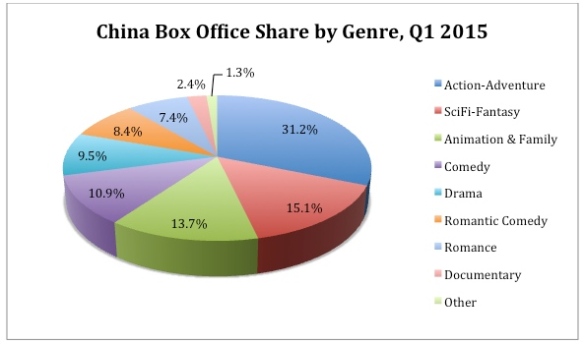 Coming soon: a look at China’s biggest male stars.
Coming soon: a look at China’s biggest male stars.
Robert Cain is a producer and entertainment industry consultant who has been doing business in China since 1987. He can be reached at rob@pacificbridgepics.com and at www.pacificbridgepics.com
A Guide to Recognizing Your Stars Part 1: Chinese Female Leads
Follow me on Twitter @robcain or Sina Weibo @robcain, or connect with me on LinkedIn.
 By Robert Cain for China Film Biz
By Robert Cain for China Film Biz
January 11, 2015
This is the first of a 2-part series.
Who are the kings and queens of the Chinese box office? It’s a pertinent question even if you don’t work in China’s film business, because owing to the size of their domestic market, these individuals are some of the world’s biggest box office draws.
They may not yet rival their Hollywood counterparts in earning power—their films don’t travel well outside the People’s Republic—but they are catching up fast. As China’s box office continues to boom, and as Hollywood studios increasingly cast Chinese stars in their movies to boost their PRC results, many of these actors will enjoy increasing global clout
You may not recognize some of the names mentioned below. Even if you’re familiar with the comings and goings of Chinese cinema, you may find yourself surprised by the names that make the list, and the ones that don’t. But if you’re in any way involved in the global entertainment industry, you’ll want to be acquainted with the who’s who of the Chinese movie scene.
This article will focus on China’s female stars, and a subsequent article will focus on the males. The actors in both articles are ranked by the aggregated mainland box office revenues, calculated in Chinese Yuan, of the films in which they appeared that were released in 2012, 2013 and 2014.
For a film to be counted toward an actor’s total, they must have been billed among the top five leads. If an actor appeared in a film but was not billed among the top five, that film is not counted toward their results. For Hollywood films in which a Chinese actor appeared, only the Chinese box office figure is tallied. Animated films in which an actor voiced a role are counted, including foreign animated films in which the actor provided a Chinese language voice dub (e.g., Deng Chao in Despicable Me 2).
So without further ado, here are the reigning divas of the Chinese film industry:
#1 Fan Bingbing.
Chinese Name: 范冰冰
Birthdate: September 16, 1981
Birthplace: Qingdao, Shandong, China
Education: Shanghai Theater Academy
2012-2014 Aggregate Box Office
(RMB): 3.41 billion
(USD): 554 million
Highest Grossing Recent Film: Iron Man 3 (2013), 753 mm RMB
For more than fifteen years since her 1998 hit TV series My Fair Princess, and then her 2003 breakout film role in director Feng Xiaogang’s thriller Cell Phone, Fan Bingbing has been at the top of the PRC’s A-list. Her acting talents have earned her a prestigious Golden Horse Award, a Hundred Flowers Award, a Huading Award, and other recognition, and Forbes China has ranked her as the number 1 Chinese celebrity for the past two years. She is among the first Chinese females to be featured in Hollywood films, with roles in Iron Man 3, X-Men: Days of Future Past, and this coming April’s The Moon and the Sun. Fan is also a successful recording star, a TV producer, and China’s top brand endorsement celebrity.
#2 Yang Mi
Chinese name: 杨幂
Birthdate: September 12, 1986
Birthplace: Beijing, China
Education: Beijing Film Academy
2012-2014 Aggregate Box Office
(RMB): 3.15 billion
(USD): 512 million
Highest Grossing Recent Film: Painted Skin: The Resurrection (2012), 727 mm RMB
The youngest of the actresses on this list, Yang Mi began acting when her parents enrolled her in classes at the China Children’s Film Studio. At just four years old she appeared as young Princess Xianyi in the TV period drama Tang Ming Huang, and by the age of 6 she was winning national acting awards. In an early film role she played Stephen Chow’s daughter in the Hong Kong martial arts comedy King of Beggars. After a stint as a magazine model she went on to star in several popular TV series, most notably as the time traveling lead character in Palace. Her breakout film role came when she played a quirky demon in the box office smash, Painted Skin: The Resurrection. She reached the #2 spot on this list mainly because she starred in the hugely successful Tiny Times romance franchise, which has spawned three sequels, and in the 2014 rom-com hit The Breakup Guru. She also enjoys the distinction of having starred in one of China’s most successful horror films, Mysterious Island. Together with her new husband, TV star Hawick Lau, she is part of one of China’s most famous celebrity couples.
#3 “Fanny” Shu Qi
Chinese name: 林立慧 (Lin Lihui)
Birthdate: April 16, 1976
Birthplace: New Taipei City, Taiwan
2012-2014 Aggregate Box Office
(RMB): 2.79 billion
(USD): 454 million
Highest Grossing Recent Film: Journey to the West: Conquering the Demon (2013), 1.25 billion RMB
Taiwan born Shu Qi is the unlikeliest of the actresses to appear in this list. The former porn actress and Playboy model somehow managed to earn the forgiveness of China’s puritan censors for having starred in such racy Hong Kong fare as Viva Erotica, Sex and Zen II and several soft core porn films, and went on to a mainstream career both in Chinese and international cinema. She has appeared opposite Jason Statham in The Transporter, she starred in the Hong Kong horror hit The Eye 2, and she won a Golden Horse best actress award for her multiple-character performance in director Hou Hsiao-Hsien’s Three Times. In addition to Hou she has worked with several of China’s other top directors, including Stephen Fung, Jackie Chan, Jiang Wen, and Feng Xiaogang.
Chinese name: 袁泉
Birthdate: October 16, 1977
Birthplace: Hubei, China
Education: Central Academy of Drama
2012-2014 Aggregate Box Office
(RMB): 2.23 billion
(USD): 362 million
Highest Grossing Recent Film: Breakup Buddies (2014), 1.16 billion RMB
Actress and singer Yuan Quan had a big year in 2014, appearing in China’s highest grossing comedy, Breakup Buddies, and its highest grossing romance, The Continent. After a 7-year education in opera at the Chinese Opera Institute that began when she was 11 years old, she entered the Central Academy of Drama in an illustrious class that included Zhang Ziyi, Mei Ting, and four other actresses who came to be known as the “Seven Golden Flowers.” Her film career started auspiciously in 1999 with the film Spring Rhapsody, for which she won a Golden Rooster Award for best supporting actress. She has since moved successfully between film, television, and music, winning numerous awards including a 2009 Billboard Music Award for Best Album.
#5 “Vicky” Zhao Wei

Chinese name: 赵薇
Birthdate: March 12, 1976
Birthplace: Wuhu, Anhui, China
Education: Beijing Film Academy
2012-2014 Aggregate Box Office
(RMB): 2.13 billion
(USD): 346 million
Highest Grossing Recent Film: Painted Skin: The Resurrection (2012), 727 mm RMB
Zhao Wei caught the acting bug at 17 when the film Hua Hun starring Gong Li came to her hometown and she was chosen to appear as an extra. Soon after, she quit her job as a kindergarten teacher and headed to Shanghai to enroll in a new film arts academy founded by legendary director Xie Jin, and then at 20 she earned the highest score in the entrance exam to enroll at the Beijing Film Academy. While still a student there she rose to national prominence when she starred—along with Fan Bingbing—in the smash hit TV drama My Fair Princess. For that role she became the youngest actress to win the Golden Eagle Award. She went on to more awards recognition for a string of film appearances, most notably John Woo’s Red Cliff, the epic adventure Warriors of Heaven and Earth and the Painted Skin films. In 2013 she made her directorial debut with the hit romance So Young, which is the fifth highest grossing film in Chinese box office history.
Please look for Part 2 of this series, which will look at China’s leading male stars.
For detailed research reports on China’s movie stars and box office, write us at info@pacificbridgepics.com.
Robert Cain is a producer and entertainment industry consultant who has been doing business in China since 1987. He can be reached at rob@pacificbridgepics.com and at http://www.pacificbridgepics.com.
Who is La Peikang and How Did He Get Here?
Follow me on Twitter @robcain or Sina Weibo @robcain, or connect with me on LinkedIn.
By Robert Cain for China Film Biz
February 11, 2013
There’s a new sheriff in town and his name is La.
OK, that didn’t quite have the gravitas I was going for. The point is that China’s New Year’s holiday week is over and the dominant organization of China’s film industry, China Film Group, has a new Chairman, La Peikang (喇培康).
La’s appointment to the PRC’s top film job signals a new direction and some interesting potential changes in the years ahead, both for Chinese filmmakers and distributors and their overseas counterparts. Namely, La’s extensive international experience overseas and in China’s co-production bureaucracy point to a likely increased focus by CFG on international cooperation and expansion.
Variously described by those who know him as “serious,” “educated and academic,” “quietly effective,” “well-liked” and “outward looking,” La could scarcely be more different than his predecessor, Han Sanping.
In the role he held for ten years, Han Sanping was a hustler, a mover-and-shaker who presided over the massive rise of China’s film industry from its status as a tiny backwater with a mere 0.7 percent share of the global box office in 2003 to its emergence as the world’s most dynamic movie territory, with a 10 percent (and rapidly rising) share of the worldwide pie in 2013.
I remember the early days of his tenure when Han Sanping would show up in Hollywood unknown and barely acknowledged, begging for meetings with studio execs, agents, movie stars, anyone who would pay attention. Most dismissed him in those days as unworthy of their time, because China was so negligible as a territory, let alone as a potential source of financing. But Han’s “Baqi” (覇气) loosely translated as “lord’s air” or “domineering spirit,” drove him to oversee the incredibly rapid modernization of the Chinese market, with the construction of 16,000 new cinema screens and a corresponding 2,700 percent increase in domestic box office receipts. Nowadays, thanks largely to Han’s contributions, China is on everyone’s mind, and it would be difficult to find a serious agent or executive who doesn’t know his name.
Given the legacy that Han created, La will find that the tables have turned and that studio heads and movie stars will eagerly, if not desperately, court his favor. Those who meet him will experience a completely different breed of Chinese movie czar. In contrast to Han’s bulldog approach, La is a more sophisticated executive, a fluent English and French speaker who is apparently viewed by China’s leaders as the right person to lead their country’s movie business to maturity and, they hope, to increasing global influence.
Before his appointment was announced, few anticipated that La would be the one to win the top job. It’s not that he lacked credentials—he was Deputy Chairman of the SARFT Film Bureau, and he had previously run an important CFG subsidiary, the internationally focused China Film Co-Production Company. But other candidates were more in the public eye, perhaps because they were more effective at outwardly promoting themselves.
When it came down to it though, it was La’s connections, his political skills, and his perceived loyalty to his Chinese Communist Party bosses that ultimately allowed him to prevail. He was chosen for the job by the Party’s ultra secretive, extraordinarily powerful Organization Department (中国共产党中央组织部), China’s political king-making office. Richard McGregor of The Financial Times described the Organization Department’s status thusly:
“To glean a sense of the dimensions of the Organization Department’s job, [imagine] a parallel body in Washington…that would oversee the appointments of every US state governor and their deputies; the mayors of big cities; heads of federal regulatory agencies; the chief executives of General Electric, ExxonMobil, Walmart and 50-odd of the remaining largest companies; justices on the Supreme Court; the editors of The New York Times, The Wall Street Journal and The Washington Post, the bosses of the television networks and cable stations, the presidents of Yale and Harvard and other big universities and the heads of think-tanks such as the Brookings Institution and the Heritage Foundation.”
This Organization Department controls more than 70 million party personnel assignments across the country, and it is no small matter to win their approval for senior party roles like La’s. Although, as McGregor wrote, “their vetting process takes place behind closed doors and appointments are announced without any explanation about why they have been made,” it’s not difficult to imagine intense lobbying, backbiting, mudslinging, and all manner of political fisticuffs. And La would have had to pass intense scrutiny– the Organization Department has access to dossiers and background checking capabilities that put the CIA and NSA to shame.
So don’t let La’s quiet, academic demeanor fool you; he’s undoubtedly as tough and effective as they come in China’s political bureaucracy. And that’s saying a lot.
Robert Cain is a producer and entertainment industry consultant who has been doing business in China since 1987. He can be reached at rob@pacificbridgepics.com and at www.pacificbridgepics.com.


